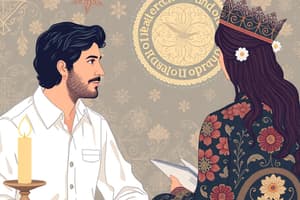Podcast
Questions and Answers
Match the following decision-making types with their descriptions:
Match the following decision-making types with their descriptions:
Programmed decision making = Involves selecting easy, repetitive, and routine operating procedures Nonprogrammed decision making = Involves making creative, novel, and unstructured decisions Rational model of decision making = A straightforward three-stage process of identifying problems and seeking alternative courses of action Organizational decision making = The process of responding to a problem by searching for and selecting a solution that creates the most value for organizational stakeholders
Match the following decision-making types with their outcomes:
Match the following decision-making types with their outcomes:
Programmed decision making = Increases efficiency and reduces costs of goods and services Nonprogrammed decision making = Finds solutions to changing and uncertain conditions Rational model of decision making = Designs and develops alternative courses of action to solve identified problems Organizational decision making = Creates the most value for organizational stakeholders
Match the following decision-making models with their descriptions:
Match the following decision-making models with their descriptions:
Rational model = Managers make decisions that favor their own interests over those of other functions Incrementalist model = Managers make incremental decisions within an overall framework of identification, development, and selection stages Unstructured model = Decision-making takes place when uncertainty is high and incremental decisions are made within an overall framework of identification, development, and selection stages Garbage-can model = Managers propose solutions to problems that do not exist and create problems to solve with pre-existing solutions
Match the following types of organizational learning strategies with their descriptions:
Match the following types of organizational learning strategies with their descriptions:
Match the following levels of organizational learning with their descriptions:
Match the following levels of organizational learning with their descriptions:
Match the following strategies for organizational learning with their descriptions:
Match the following strategies for organizational learning with their descriptions:
Match the following types of games in game theory with their descriptions:
Match the following types of games in game theory with their descriptions:
Match the following top-management team configurations with their effects on organizational learning:
Match the following top-management team configurations with their effects on organizational learning:
Match the following means of overcoming cognitive biases with their descriptions:
Match the following means of overcoming cognitive biases with their descriptions:
Match the following strategies for organizational learning with their effects on decision making:
Match the following strategies for organizational learning with their effects on decision making:
Match the following cognitive biases with their definitions:
Match the following cognitive biases with their definitions:
Match the following knowledge management approaches with their descriptions:
Match the following knowledge management approaches with their descriptions:
Match the following types of organizational culture with their characteristics:
Match the following types of organizational culture with their characteristics:
Match the following IT-enabled organizational relationships with their implications:
Match the following IT-enabled organizational relationships with their implications:
Match the following factors affecting organizational learning with their descriptions:
Match the following factors affecting organizational learning with their descriptions:
Match the following cognitive structures with their impacts on decision making:
Match the following cognitive structures with their impacts on decision making:
Match the following cognitive biases with their effects on organizational learning:
Match the following cognitive biases with their effects on organizational learning:
Match the following cognitive biases with their manifestations in decision making:
Match the following cognitive biases with their manifestations in decision making:
Flashcards are hidden until you start studying
Study Notes
Decision-Making and Organizational Learning
- Decision-making types are matched with their descriptions
- Decision-making types are matched with their outcomes
- Decision-making models are matched with their descriptions
Organizational Learning Strategies
- Types of organizational learning strategies are matched with their descriptions
- Levels of organizational learning are matched with their descriptions
- Strategies for organizational learning are matched with their descriptions
Game Theory
- Types of games in game theory are matched with their descriptions
Top-Management Team Configurations
- Top-management team configurations are matched with their effects on organizational learning
Cognitive Biases
- Means of overcoming cognitive biases are matched with their descriptions
- Cognitive biases are matched with their definitions
- Cognitive biases are matched with their effects on organizational learning
- Cognitive biases are matched with their manifestations in decision making
Knowledge Management
- Knowledge management approaches are matched with their descriptions
Organizational Culture
- Types of organizational culture are matched with their characteristics
IT-Enabled Organizational Relationships
- IT-enabled organizational relationships are matched with their implications
Factors Affecting Organizational Learning
- Factors affecting organizational learning are matched with their descriptions
Cognitive Structures
- Cognitive structures are matched with their impacts on decision making
Studying That Suits You
Use AI to generate personalized quizzes and flashcards to suit your learning preferences.




